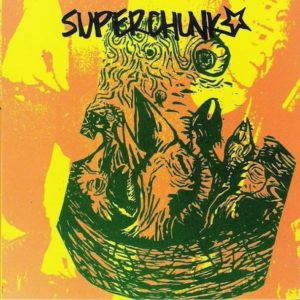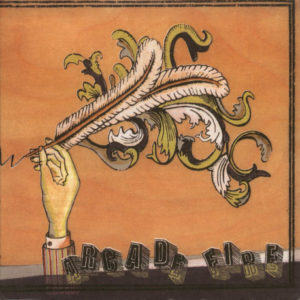Merge Records: 30 Years, 30 Tracks

All of our favorite labels are all grown up. Last year, Sub Pop celebrated three decades of releasing music (even though its original zines started well before that), and this year, its kindred spirit across the country in Chapel Hill, North Carolina, Merge Records hits the three-decade mark as well. Founded by Superchunk’s Mac McCaughan and Laura Ballance in 1989, the imprint initially issued a series of 7-inches and cassettes before releasing the first full-length LP, Superchunk’s Tossing Seeds singles compilation.
Of course, it’s grown quite a bit since then. Though at first it was a DIY affair that saw their now-iconic logo slapped on recordings by a handful of local Chapel Hill groups along with bands from Kansas (Butterglory) and New York (Bricks), eventually the roster expanded to include some up-and-coming acts from Canada (Arcade Fire, Destroyer) and London (The Clientele, Ibibio Sound Machine), as well as some artists that even influenced the bands on the Merge roster (Bob Mould). It was once an outpost for promising young underground bands, and it still is. But it’s also become a respected brand, and home to too many great bands to mention.
As the label launches a year’s worth of anniversary festivities, we’ve assembled a list of 30 of our favorite tracks from Merge Records’ history. There are, of course, plenty more where these came from. So think of it as a starter’s sampler of essentials, and then go from there.
 Superchunk – “Slack Motherfucker”
Superchunk – “Slack Motherfucker”
from Superchunk (1990)
There is no Merge Records without Superchunk, but there is arguably no Superchunk without this song. Merge’s seventh release overall would define both the label and the band, their first single not credited under their old name Chunk. Superchunk’s version of power pop with fuzzed-out punk guitars and screamed melodies wouldn’t propel a full album until at least 1991’s No Pocky for Kitty on the Matador label. Instead, it was early vinyl sides like “Slack Motherfucker” that showed them in their best light for the first few years of their career. They could not have kicked things off better and tighter than with Mac McCaughan’s desperate, matter-of-fact portrait of a lazy coworker. If members of the freaking Minutemen themselves were keen enough to cover it, surely Superchunk were on to something. – Adam Blyweiss
(Note: the “Slack Motherfucker” 7-inch was released on Merge, though the album was originally released via Matador)
 Drive Like Jehu – “Bullet Train to Vegas”
Drive Like Jehu – “Bullet Train to Vegas”
(1992)
Drive Like Jehu only released 20 songs during their career, which is an astonishing bit of trivia to be sure, considering the influence and legend of the band. Two years before they issued their landmark album Yank Crime, the San Diego post-hardcore quartet released a double-sided selection of bruisers on Merge—along with a couple of singles from John Reis’ other band Rocket from the Crypt and the Reis-produced Superchunk album On the Mouth. The b-side to “Hand Over Fist” is the explosive standout, a song that sounds like it’s speeding toward oblivion without brakes. That’s what a lot of the band’s taut, intense anthems sounded like, but even so this one feels just a little bit more like an impending collision, one of the most dangerous-sounding things the label ever released. – Jeff Terich
 Polvo – “Stinger (Five Wigs)”
Polvo – “Stinger (Five Wigs)”
from Today’s Active Lifestyles (1993)
Hailing from Chapel Hill—Merge’s own backyard—Polvo were tagged as “math-rock” early on, which doesn’t quite describe the power and volume of their work, just the complexity (which has some strange time signatures, certainly, but mostly start-stop dynamics). “Stinger” is one of the best examples of why that is—shifting tempos, disparate pieces, and an epic progression of intricate segments. But at heart it’s a burly rock song, one that utterly destroys when moving at a full clip. Sure, all music requires some level of math, even if it’s just rudimentarily counting to four. But Polvo’s formula yields simply some great rock music. – Jeff Terich
 Neutral Milk Hotel – “Two Headed Boy”
Neutral Milk Hotel – “Two Headed Boy”
from In the Aeroplane Over the Sea (1998)
There has been enough written about In the Aeroplane Over the Sea at this point that adding much more to the analysis, discussion and legacy of the piece is practially impossible. However, “Two Headed Boy” Jeff Mangum’s lyrically cryptic lo-fi solo endeavor is a haunting, mysterious masterpiece. Mangum’s vocal range here feels like a full band, overshadowing his own guitar work with nuanced pace, breathy, at times smooth like velvet, at times pensive and afraid of its power. The guitar tone and work is perfectly serviceable, but it’s the lyrics with perhaps allusions to Anne Frank, or the exposure of fame and success, that regardless become a powerful, spellbinding communion between listener and artist. – Brian Roesler
 …And You Will Know Us from the Trail of Dead – “Mistakes and Regrets”
…And You Will Know Us from the Trail of Dead – “Mistakes and Regrets”
from Madonna (1999)
“Mistakes and Regrets” is the opener to Trail of Dead’s second album Madonna. And what an opener it is. It’s a post-punk menagerie of hardcore leanings, with vibrant, thrilling guitar compositions that fall between lulls of ethereal bass and shattering percussive cadences. It’s a track that cannot lose its momentum, even when it purposefully slows down to build dramatic tension. There’s so much raw emotive energy behind it that its power and impact is akin to that of aural alchemy. – Brian Roesler
 Magnetic Fields – “Papa Was A Rodeo”
Magnetic Fields – “Papa Was A Rodeo”
from 69 Love Songs (1999)
The 3-CD psalmbook 69 Love Songs—arguably the most adored self-imposed homework assignment in music history—is just as overwhelming a presence now as it was 20 years ago, even as a few of its lesser-acclaimed tracks have sifted themselves off the cubicle playlists of sub-romantics. About a third of its songs could plausibly be in this article, but “Papa Was a Rodeo” is as close to a centerpiece as it can claim, and probably the most popular track by points. As one generally does when they’re writing 69 love songs in one go, Stephin Merritt rendered down a bunch of pop styles and personas for closer examination. “Papa Was a Rodeo” benefits the most from his off-hand gender agnosticism and very careful romantic distance. That this collision between two down-on-their-luck saloon dwellers has an atypically happy ending enhances its charm. If you’d rather, substitute it with any 69 Love Songs track that clocks in at 90 seconds or more (except “Love Is Like Jazz”). – Paul Pearson
 Lambchop – “Up With People”
Lambchop – “Up With People”
from Nixon (2000)
Nashville’s Lambchop have never quite fit in comfortably anywhere someone would have them. Though they sometimes feature pedal steel and hail from country music’s capital, they’re not exactly country themselves. Sometimes they’ll Auto-Tune the better part of a double album, sometimes they’ll sound more like ’70s soul. But “Up With People,” the highlight of their career-high Nixon—a kinda-sorta concept album about our former president (kinda)—-more than anything showcases them as a powerful ensemble guided by the songwriting talents of Kurt Wagner. A backing choir implores “Come on progeny!” against an alternately noisy and jazzy Americana strut that feels a bit like Glen Campbell playing through Lee Ranaldo’s amps, and though on a marketing level it’s probably a head-scratcher, through headphones it’s sublime. – Jeff Terich
 Crooked Fingers – “Big Darkness”
Crooked Fingers – “Big Darkness”
from Red Devil Dawn (2003)
A couple months ago I saw Eric Bachmann in a residential attic in San Diego, and after playing through a number of solo and Crooked Fingers songs, as well as a stripped-down take on Archers of Loaf’s “White Trash Heroes,” he opened it up to the floor: “What do you guys wanna hear?” A lot of people hollered for “Web in Front” or “Harnessed in Slums,” but I couldn’t stop myself from requesting “Big Darkness.” The first track from Bachmann’s third album with Crooked Fingers, “Big Darkness” is a gorgeously ragged fable that turns popular song tropes on its head. “There ain’t no moon, and there ain’t no stars,” Bachmann sings, foretelling of a “hero coming soon” who’ll finally rid the town of its giant ball of burning misery. The darkness is a blessing, in a way that such a skewed perspective would only make sense in a Tom Waits song, albeit one in this case delivered with the earnest heroism of Springsteen. He didn’t play it, but it won’t stop me from asking again the next time we find ourselves in a shared space. – Jeff Terich
 East River Pipe – “I Won’t Dream About the Girl”
East River Pipe – “I Won’t Dream About the Girl”
from Garbageheads on Endless Stun (2003)
F.M. Cornog, aka East River Pipe, is a one-man recording act from New Jersey whose artistic isolation has supplied Merge with some of its most somber, unredeemed sides—or would, if Cornog’s pop songwriting faculties weren’t so first-rate. Cornog’s songs run the emotional gamut from indifferent to doleful, with little chance for catharsis and every opening for despair. And I love a whole bunch of them without question. “I Won’t Dream About the Girl” treads the line between tenderness and creepiness, with a slowly unfolding Philly soul chord progression buffeting a story about a couple who are clearly each other’s second choices at best. Cornog’s icy synth lines give the song its strangulated longing and tarnished last chance. The mood’s so complete that he only needs a pair of couplets and a two-line refrain to drive his point home, and I’m not even sure what the words to the second verse are. – Paul Pearson
 Arcade Fire – “Wake Up”
Arcade Fire – “Wake Up”
from Funeral (2004)
It just had to be. Arcade Fire have had more popular songs as their success has skyrocketed, but nothing captures the rise of the Canadian indie powerhouse quite like “Wake Up.” Though they eventually made the move to major label Columbia, Arcade Fire actually remained loyal to the independent label for a long time after they’d achieved superstar level fame. That’s in no small part thanks to the shot Merge gave them due to the songs on Funeral. There’s something undeniably exhilarating about it, the crunching guitar quartets and that indomitable chorus of “aah aah aaaaaah”s get the blood going in a way that inspires action and made it the obvious choice for soundtracking a plethora of adventures, from Where the Wild Things Are to Walter Mitty. Bigger things have come from Arcade Fire, but “Wake Up” is a snapshot of a time when their raw energy was enough to sustain them. – William Lewis


 Superchunk – “Slack Motherfucker”
Superchunk – “Slack Motherfucker” Drive Like Jehu – “Bullet Train to Vegas”
Drive Like Jehu – “Bullet Train to Vegas” Polvo – “Stinger (Five Wigs)”
Polvo – “Stinger (Five Wigs)” Neutral Milk Hotel – “Two Headed Boy”
Neutral Milk Hotel – “Two Headed Boy” …And You Will Know Us from the Trail of Dead – “Mistakes and Regrets”
…And You Will Know Us from the Trail of Dead – “Mistakes and Regrets” Magnetic Fields – “Papa Was A Rodeo”
Magnetic Fields – “Papa Was A Rodeo” Lambchop – “Up With People”
Lambchop – “Up With People” Crooked Fingers – “Big Darkness”
Crooked Fingers – “Big Darkness” East River Pipe – “I Won’t Dream About the Girl”
East River Pipe – “I Won’t Dream About the Girl” Arcade Fire – “Wake Up”
Arcade Fire – “Wake Up”